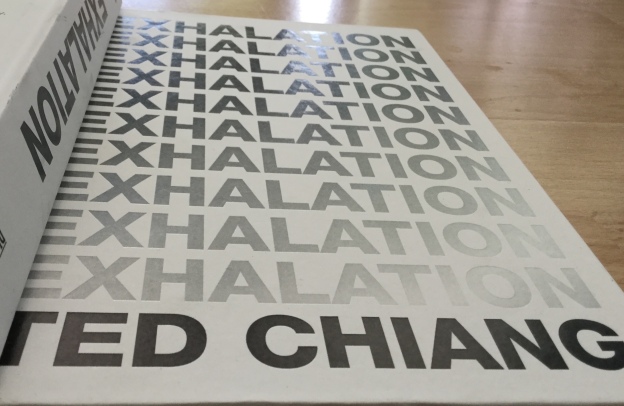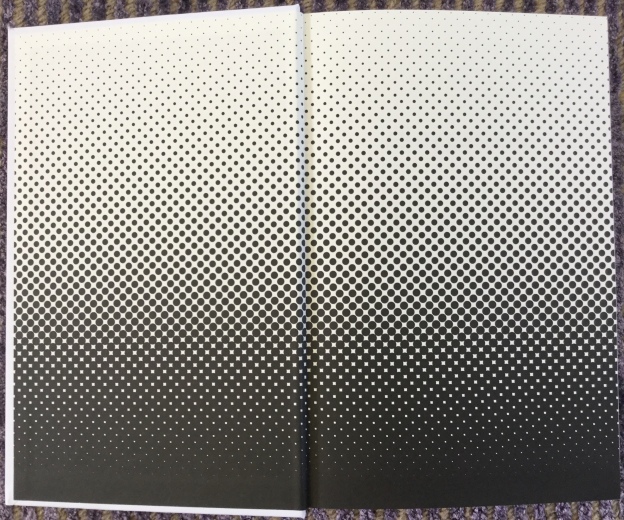Exhalation – Ted Chiang


PICADOR 2019
My previous review of Ted Chiang: https://dflewisreviews.wordpress.com/2016/11/25/stories-of-your-life-and-others-ted-chiang/
When I read this book in due course, my thoughts will appear in the comment stream below…

“Coincidence and intention are two sides of a tapestry, my lord.”
Whereby many of time’s invisible tapes try each to reach their intended targets along the various audit trails. Synchronicity or coincidence merely providing way stations by which means the tapes try to cross each other. As if on a loom of fate. That’s my theory, if not the theory of this subtly disorientating story of ancient Baghdad, told in different voices, a tale of the Alchemy of Time, a door of a few seconds into the future, little more than a conjuror’s trick, and a door twenty years into the future. The intricacies of changing things or just knowing things better are factored into older and younger selves of the same person, like Proust’s selves potentially mingling together and selfishly optimising this fixed doorway, amid all the emotions of love and regret. And now having read this work, there can be no chance of unreading it. At least you have been warned by dint of this real-time review, a review as part of some tapestry or Gestalt. You owe me nothing. Just take your chances, at least with some awareness. Unlike those who did read it before me and decided not to leave some message behind or bring some message back or forward. The author did not write it. Chiang has changed. Or is still changing. Tricks can last a moment or an eternity. Time to read it again. Each reading is to try understand it better. Then write it for the first time. A palimpsest of time’s tapes. Listening to each storyteller and playing them back to others. When the future comes. When books are printed or digitalised or made into Venn diagrams. Extramural theorising again, I guess. No time even to breathe.
EXHALATION
“, and through the collaborative action of your imaginations, my entire civilisation lives again.”
A möbius of gold leaf that puts in train many thoughts that burn almost to a frazzle as one grapples with this text. The concept of a “solipsistic periscope”, a self-surgery on the ‘brain’, and the concepts of (re-)slottable lungs with filling stations of air like electric cars need filling stations of electricity, and a universe still in its single First Cause/ Last Mover exhalation, clocks and air pressure in tune, or out of tune, with each other, where the balance — of those gold levers creating air-kisses of writing upon themselves — is kept in equilibrium, or not! Equilibrium is not necessarily equilibrium at all, I guess. And I am, I claim, the Gestalt Real-Time Reviewer who is addressed as ‘you’ at the end. Think about it! Think about it, you who know how my dreamcatching or hawling processes of book critique actually have worked, still working, since a single breath away in 2008.
“The lattice was not so much a machine as it was a page on which the machine was written, and on which the machine itself ceaselessly wrote.”
*
As an aside, a mere Fortnite, today, seems longer than any such conceived exhalation or sigh?
“some unspeakable Lovecraftian horror,”
A vignette about a device that seems to prove the absence of free will. Well. I recommend you don’t read this. You will know why, if you do. Still, I already have accepted certain things, having been steeped in Gestalt Real-Time Reviewing processes since 2008. You will also know what I mean, if you read it. Perhaps take a deep breath before you do.
THE LIFECYCLE OF SOFTWARE OBJECTS
.This looks like a novella in store for me.
Pages 62 – 67
Intriguing in the same two days I have mentioned FORTNITE in two other reviews as well as this one above, a virtual game (that I had never heard of until yesterday!), mentioned because of world news of a tontine contest in The Arthur Ashe stadium, where the secondary life of gaming created such big news. Indeed, more than just intriguing as I have just started reading this novella wherein Ana Alvarado is more or less approached WITHIN an earned-avatar virtual world to take on a job in a zoo of virtual animals, instead of her ambitions in getting a real zoo job, or so I infer. I am so naïve in such matters, I am possibly the best tabula-rasa reviewer to enter the realms of this novella…
Not a secondary life, at all, I guess? We shall see. I know virtually nothing about such gaming, I also declare!
I was helped in hindsight by this. BEWARE SPOILERS, of course.
https://en.m.wikipedia.org/wiki/The_Lifecycle_of_Software_Objects
“It is an inverted pendulum, prone to oscillations of ever-increasing magnitude. If we can only keep the pendulum vertical, there is no need for subsequent correction.”
…in the compensating trends of child-rearing, indulgence and strictness, kept in strict balance beyond any upward swing. Far-fetched at each pause-point, beyond the compensating prejudices that every father is farther along the spectrum of swing towards strict stasis and women as mothers towards that of indulgence. Just like fiction in its search for believability in the far-fetched instead of scepticism in the nigh impossible. Here the eponymous device and its effects need such lateral brainstorming thought. Between tragedy and comedy, is plain living. Each influence of unexpected results versus what is common sense. I learnt a lot from this fable. Between the mad scientist and the stolid grey stoic is someone like you and me. Everyone is the optimal between inventive free will and autonomous fate. Between the press of flesh and the jab of machine.
How can we possibly “forgive and forget”, when all is now recorded of our life by something called REMEM, the ‘I’ that is me embedded in the screen as TV to make a lost race of people called TIV. But that is MY ‘story’ of this ‘story’ that the author uses to express the distinction of being RIGHT and being PRECISE in the light of his relationship as a father to his daughter, viz. right (feeling) and precise (fact) being the two sections of gestalt truth. But how can it be more than a story when all current readers know that REMEM itself is a story. Not invented yet. Or has it? This work makes me FEEL that all that we do is indeed recorded for later playback, the missionary with the TIV, the nature of writing words with spaces between, and the act of remembering things and retelling them differently rather than being frozen in print. But is print truly frozen, truly unspoken? My version of this story that I have just read IS on paper pages, but I have a faith in the mutability of print as my Gestalt real-time reviewing has attested over the years. Things come at night and change the print before I start reading it again. And are there ebook or audio versions of this book? Which of us is the Proustian self as the core of what we are as a series of intrinsic beings with fallible memories? Writing as the way to decide or change what you eventually want to say. And a daughter who also finds her own memory of the difficult relationship with her father becomes as mutable as his. Forgive and forget is better than remembering everything, I say. But this is a story that uniquely conveys truth by being a story that KNOWS it is a story — by checking out the story’s own inbuilt concept of REMEM — to watch the writer writing it from within a world where REMEM has not yet been invented! Our own culture’s reverence for the written word versus the anthropology of oral cultures, notwithstanding. That’s another debate.
“It’s no coincidence that ‘aspiration’ means both hope and the act of breathing.”
An eventually moving account or appeal, given by our world’s fading parrots, factored into by the Fermi Paradox — why do we humans strive to awaken the dead universe for ulterior life, when these parrots are here, so close to hand, already? By rote or wrote, the parrots perhaps still fashion us from within, I wonder. The message is in repeating it.
“I explained that it was like assembling a jigsaw puzzle; sometimes we found many pieces that fit with one another, but we didn’t know where they belonged until we found the piece that connected them to our main chronology.”
…and for ‘main chronology’, please read ‘gestalt.’ This is a remarkable, arguably life-changing work of so-called fiction, remarkable as a story despite some forced dialogue of info-dumping, a story of Faith in God or the First Cause, of navel-less and smooth tree-ring archaeology as a finite foundation of that faith without the taint of abandoned souls in infinity, plus astronomy, the concept of free will as well as fate, astrological harmonics (I believe, now, in hindsight, that I was meant to study the synchronicity (as above, so below) of astrology rather than its cause and effect, in the 1970s as the perhaps preternatural preparation for reading this ‘story’), a story containing the comforting context of personal tragedy within an overall plan by God or as this woman archaeologist narrator calls Him, Lord. This story is without a navel, too, despite the ironic title. God’s purpose is not damaged, as it is feared it is damaged, feared by those once faithful people now suffering otherwise inexplicable personal tragedy. You see, the story’s outcome of perceived discovery is that the overall plan of meaningfulness is spinning cosmically around a different planet to ours, thus leaving humanity’s planet Earth as a side-issue. I say, however, that it spins instead around the gestalt of human literature, as the first cause’s ultimate effect and comfort, and it is THIS story that is arguably the connecting piece mentioned above in such a gestalt – or, at least, as I, the Gestalt real-time reviewer who helps triangulate such coordinates of purpose, would argue. The ultimate power that is cosmic irony.
– from Chiang’s The Great Silence
“We’re not always wanting what other people have. But with a prism, it’s not other people, it’s you. So how can you not feel like you deserve what they have? It’s natural. The problem isn’t with you, it’s with the prism.”
A madcap read, mind aglow with quantum things, my eyes reading up close to the paper, glasses off, trying to spot my paraself looking through. It is about the invention of the prism, an acronym, but don’t go there, a communication pad for yourself in one parallel world with other yourselves and others in general in another world, a pad that is limited, and when you reach the end of the pad it finishes without ability to extend the communication. Later, the pad has its scope extended, but still limited. A bit like Twitter, when they increased the number of maximum characters. And the characters of yourself here interact, with all manner of self-help, bitterness and political correctness. In one car crash with celebrities, one dies in one world, the other in another. I felt we are exploring our nasty sides on Twitter, when I use it. I put my glasses back on and sit back and wonder what on earth I have just read; I no longer understand even myself in this world, let alone myself in another! A coda to this book, a wild ride that tries to expunge what I learnt from Omphalos! I go back and I’ll probably find that Om story has changed out of all recognition since I first read it. Good job I am a REAL-TIME reviewer, not one who looks back at things, look back at things too late.
“: each prism was like something out of a fairy tale, a bag containing a door to another world, and yet most of those worlds weren’t particularly interesting…”
sigh.
end